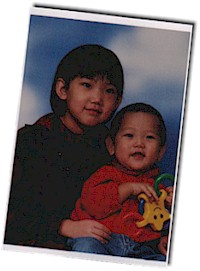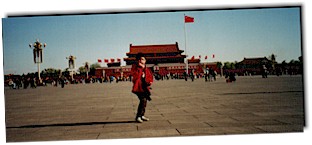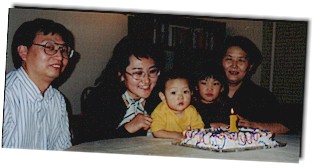Gao Wei is a Chinese woman who now lives in the U.S. Her daughter Maggie was born in the U.S. and is now 6 years old. Like adoptive families, Cindy's family also struggles with the issues of teaching Chinese language and culture to her child while living here under the influence of American culture. Read her first article in a series, "Our Constant Culture Shock: Chinese Parents with an American Born Child," to see how she and her husband are coping.

In the summer of 1993, I found out that I was pregnant. It was not at all a pleasant surprise. I had come from China to the United States less than two years before, and I was still a graduate student trying to finish my Master's degree. The idea of having a baby was beyond my comprehension, especially since my husband was off in another state, working on his Ph.D!
 But, somehow, we managed to get through all the difficulties and had a
wonderful little girl whom I named Maggie. She has been lucky enough to be
our first child and the recipient of all those scientific methods that well-baby
books teach, although she has still had to suffer through our panic attacks and
occasional nervous breakdowns. In spite of all that, she turned out to be
a perfectly normal toddler in no time at all. And that was when culture
shock first started to transform our little family.
But, somehow, we managed to get through all the difficulties and had a
wonderful little girl whom I named Maggie. She has been lucky enough to be
our first child and the recipient of all those scientific methods that well-baby
books teach, although she has still had to suffer through our panic attacks and
occasional nervous breakdowns. In spite of all that, she turned out to be
a perfectly normal toddler in no time at all. And that was when culture
shock first started to transform our little family.
I still remember the baby shower that the Department gave to me right before Maggie’s birth. One of the professors asked me, “So, your daughter is going to be an American, right?” I joked back, “Yes, I am going to be a Chinese who is an American’s mom!” It now sounds a little ironic, for as time goes by we realize that it is no joke at all. Our family, like so many immigrant Chinese families, is living with this irony day in and day out.
We thought we were raising Maggie in a very Chinese way: we spoke Chinese at
home, we cooked Chinese food all the time, our Chinese friends always came over
on the weekends, and we celebrated Chinese New Year instead of
Thanksgiving. But as time went by, we did need a detective’s mind to see
that Maggie was not one of us.
Take food, for example: My husband despises American food, while McDonald's and Burger King are Maggie’s favorite fare. Then there was the day that I overheard Maggie telling a friend of hers, “ You know what? My parents eat pig’s ears and feet!!!” Ever since then, we've been cooking separate meals for her when we want to eat our gourmet delicacies. (Actually, I think she is setting up a link, pointing us to the site of the Big Bad Wolf, who might turn out to be better than her parents. After all, he never actually ate those cute little pigs!)
Language has been another sore subject. More and more, Maggie has been talking in English when she describes her day at day care and pre-school. When I have asked her to speak in Chinese, she's said, "I don’t have a Chinese word for it, Mommy, it's an English thing!”
Well, maybe that is the way it should be. After all, she was born here and has been raised in American culture, so of course she is different from us. At least she is not like the "ugly duckling," the poor swan who was born into a duck family. But as parents, we still can’t help but worry about her.
We are worried that when she grows up, she will not know who she is and where she belongs. She is not a Chinese, since Chinese people think she is too Americanized: she laughs too loud, eats too much junk food, and shows too much expression when she talks. But she is not a mainstream American either, since she looks so Chinese and acts differently sometimes. And she is especially different because she has a weird Mom and Dad who were thinking how delicious certain birds would be if they were fried, while all the other "normal" American parents were enjoying the beauty of these creatures during a student fieldtrip to the Zoo.
Fortunately, it seems that only my husband and I are confused about my daughter’s identity. Maggie is not puzzled at all -- at least not at the moment. She has discovered her own magic way to settle things: language. When she was still a toddler and learning to talk, that was how she distinguished an American from a Chinese. She used to tell me, "She is an English person. I am a Chinese person." She has known from the beginning that she should not distinguish people by the color of their face or by their race, but that she can differentiate them by the way they talk. Isn’t she cool? Somehow, we as adults can’t seem to grasp this simple truth.
But there was one day when she got confused, briefly. It was when I took her to a Chinese church in Syracuse, NY, when she was about four years old. She noticed a teenage Chinese girl talking to her mom only in English, while her mom responded to her totally in Chinese. Maggie asked me, “Why is a Chinese mom having an English daughter?” Later, when I told that mother about my daughter’s question, she sighed and told me that she used to have a dream about having her daughter read the Dream of the Red Mansion to her [in classical Chinese]. That dream had disappeared. She did not think Maggie’s good Chinese was going to last long, “Just wait until she grows a little older, you will see," she warned me.
Two years have passed since then, and Maggie will be finishing kindergarten soon. She still talks in Chinese with us quite a lot, but her level of Chinese has not caught up to the speed by which her English has been improving. However, my husband and I are still struggling along bravely in this seemingly bound-to-lose battle. But now, the opening of a local Chinese school may come to the rescue!
--To be continued. Please read my next article about Maggie’s Chinese language study “Learning Chinese is NOT fun, but no choice”.
